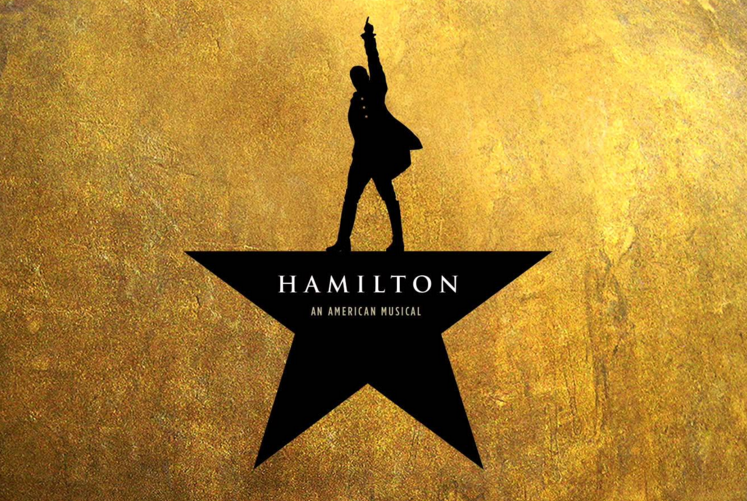For musical theater fans, Buzzfeed readers, and my poor neighbors who have been listening to me sing along terribly to the soundtrack for a month, the musical Hamilton is an inescapable phenomenon.
Composer / actor / singer / playwright / rapper / is-there-anything-this-man-can’t-do Lin-Manuel Miranda, previously known for the 2008 Tony-award-winning musical In the Heights, is back with a Broadway homage to the “Ten Dollar Founding Father” Alexander Hamilton. And he’s stealing the spotlight, press coverage, rave reviews, and my heart.
So what is it about Hamilton that captured the nation’s imagination?
Speaking as someone with a weird historical crush on A. Ham since fifth grade, sure, the subject helps.
But more important is the way Miranda redefines what it means to lay claim to a country’s history.
To show what I mean, a picture’s worth a thousand words … so here are two. This is the cast of Hamilton:

And here’s a painting of the real Battle of Yorktown:
Presumably you’ll notice a theme in the painting that’s missing in the cast.
A white, male, land-owning, middle-aged, rich, slave-owning theme.
History is written by the victors — but the darker undercurrent in the lives and actions of our Founding Fathers is there if you look.
Thomas Jefferson’s rape of and illegitimate children with Sally Hemings, a slave at his Monticello plantation, should be enough to make anyone feel squeamish celebrating the author of the Declaration of Independence as an uncomplicated beacon of freedom.
George Washington’s 56-year history of owning slaves casts a different light on the Father of American Democracy — that is, democracy for white land-owning Christian men, and no one else.
Sure, Washington famously freed his slaves … but he did so in his will. Where people dispose of property. And where the act couldn’t be carried out until after his death, when slaves would be of no use to him anyway.
Though Hamilton himself expressed abolitionist-leaning views, his was a minority voice, and was more nuanced than apologetic biographers have suggested.
239 years later, our social justice movements are still stuck with the color-blind activism of Jefferson and Washington. These men could sit comfortably with the cognitive dissonance of fighting a war for freedom from tyranny while owning African slaves, in the same way that “White Feminism” can fight for the social, political, and economic equality of the sexes while rejecting the Black Lives Matter movement and pushing the lived experiences of people of color to the side.
Because freedom and equality aren’t about race, right? That’s something we can worry about after we white folks get our rights.
Miranda, in Hamilton, takes this one-track mindset and burns it to the ground.
The musical is set during the American Revolution and its immediate aftermath, but the race-bent cast and script bring the black American experience to the forefront. The Founding Fathers — Hamilton, Washington, Madison — are reimagined as fast-talking, verse-dropping, racially aware, insightful social commentators with something to prove.
Jefferson’s slaveholding past isn’t glossed over; it’s discussed and denounced in a presidential Cabinet meeting. Hamilton and Lafayette aren’t quietly second-guessing slavery on their own time; they’re, in their own words, “a bunch of revolutionary Manumission abolitionists.”
From beginning to end, Miranda shatters the academic divide between black history (relegated to the shortest month of the year) and American history (the history of every single day of the year).
Even Hamilton’s own racial background doesn’t escape examination. Born out of wedlock on Saint Kitts and Nevis in the Caribbean, Miranda’s script makes Hamilton’s illegitimate immigrant identity a constant source of othering. His enemies use his immigration status to discredit his ideas, political theories, and value to the revolution.
Anyone who has watched a Republican debate in the past two months will be familiar with these tactics.
If this kind of racial discussion feels unusual in the context of early American history, that’s because it is.
The version of US history taught in schools continually sweeps issues of race under the rug. The white mainstream romanticizes our past, whether that’s 1956 or 1776, as a simpler, more innocent time — and in doing so completely disregards the experience of people of color during those periods.
It’s as if black people were enslaved, “liberated” by Lincoln, and then disappeared from the scene until Martin Luther King, Jr., with no role to play through the rest of the narrative.
But Hamilton refuses to play along. Just as it creates space for itself in the overwhelmingly white, wealthy, and elitist world of Broadway, it inserts itself into early American history, about which the same critique applies.
It takes the half-story we’re fed through revisionist (and sometimes straight-up racist) textbooks and makes it a three-dimensional phenomenon. Something that speaks to what our nation should be, not the white supremacist experiment it was.
The musical doesn’t set out to make American history about race. Race has always been a part of American history. Mentioning what has gone undiscussed is not “playing the race card” — it’s telling the story honestly.
“‘Honestly’? But Alexander Hamilton was a white man!” you say. (White-passing, at least, but that’s another story.) “George Washington and Thomas Jefferson were white! Isn’t this the same as characters of color being played by white actors — that thing intersectional feminists and feminists of color are always complaining about?”
No, actually, it’s not.
Hollywood whitewashing historical figures is as reliable as the sun rising in the east. From Elizabeth Taylor as Cleopatra to Christian Bale as Moses, white folks playing people of color (with or without blackface) is nothing new.
But reversing the trend isn’t reverse racism. It’s revolutionary.
A Puerto Rican Alexander Hamilton and a black Aaron Burr (who, side note, has the voice of an angel) does not take away the historical importance of white people. Good luck undoing the effects of colonialism, imperialism, and slavery with a 2.5-hour musical.
But it does call out hypocritical undertones of our nation’s most firmly held origin story.
In 2015, where it’s impossible to open up your Twitter feed without finding instances of police brutality, a racist legal system run wild, or racial microaggressions, seeing a black George Washington and a black Marquis de Lafayette lead the charge at Yorktown attacks the twisted, white supremacist double standard that says revolution is noble and admirable … but only when done by white people.
We’ve heard it a thousand times: The Founding Fathers risked their lives for our freedom, and we live by their example. And yet when people of color use radical means to lobby for social equity — when they respond nonviolently to the very real, pervasive threat of violence — we white Americans deplore their tactics and label them as lawless thugs. We derail the conversation with respectability politics.
“I agree with what you’re saying,” we hedge, “but do you have to make such a scene?”
If radical, sometimes dangerous revolution is acceptable from George Washington but not from a black American, let’s see what America makes of a black George Washington.
Maybe, America will have a quiet moment of revelation.
One can only hope.
Even if Hamilton weren’t the damned catchiest musical I’ve ever heard — which it is — it would be an incredible artistic and social achievement, and more than worthy of the attention it’s been grabbing.
It’s worth noting that the play’s full name is Hamilton: An American Musical.
And Miranda’s insightful, pull-no-punches, straight-into-the-fray America is the kind I wish I lived in, and the kind I hope we’re steadily working toward.
So when Hamilton makes its way off-Broadway and tickets are available sooner than 2020, you can bet that I’m buying mine immediately.
Meanwhile, I’ll continue to blast the soundtrack around the house. Sorry, neighbors.

